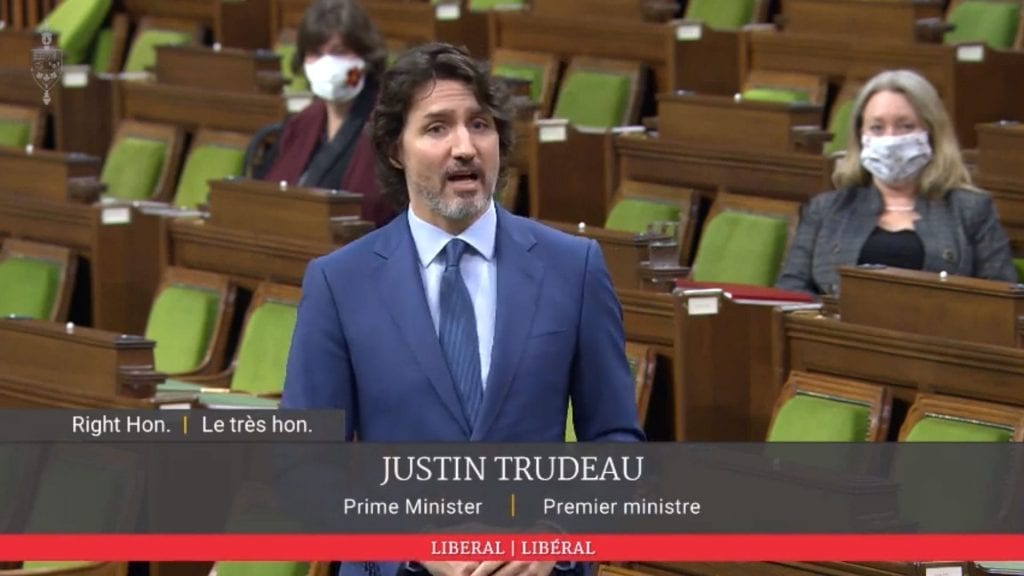
The prime minister during a sitting of virtual Parliament in March. He said "decades of neglect" have created lack of access to potable water for some First Nations. Photo: APTN
Federal officials dodged accountability on Wednesday after a government document obtained by APTN News revealed Indigenous Services Canada has pushed back its timeline for lifting on-reserve drinking water advisories by at least another two years and may not have long-term solutions in place until March 2026.
NDP Leader Jagmeet Singh, calling the delay “absurd” and “outrageous,” slammed Prime Minister Justin Trudeau and called for an explanation during question period in the House of Commons.
“It is not good enough and people are fed up with excuses,” said Singh. “Why does this prime minister keep on breaking promises to Indigenous people?”
Earlier in the day, AFN National Chief Perry Bellegarde also demanded answers from the Liberals.
“In a country as rich and privileged as Canada, First Nations should have clean drinking water,” said the national chief via tweet. “The federal government must immediately explain to Canadians and First Nations leaders why the timeline keeps being pushed back and how we can fix this.”
In a country as rich and privileged as Canada, First Nations should have clean drinking water.
The federal government must immediately explain to Canadians & First Nations leaders why the timeline keeps being pushed back and how we can fix this. #cdnpoli https://t.co/XL5x1Z4K4g
— Perry Bellegarde (@perrybellegarde) May 5, 2021
Trudeau’s reply sidestepped accountability and didn’t explain why the target has been extended. He said “decades of neglect” have resulted in some First Nations not having access to clean water, adding that Ottawa pledged $1.6 billion for water infrastructure last fall.
“We will directly contribute to lifting advisories and stabilizing operations,” said Trudeau. “Since 2015, we’ve lifted 106 long-term drinking water advisories — and we remain aggressively committed.”
The new timeline was quietly revealed by a government action plan tabled shortly before a meeting of the House of Commons Public Accounts committee last week. The document lays out Ottawa’s spending plan along with key objectives for the next five years.
It lists “FY 2023-2024” — likely meaning “fiscal year,” which begins in the spring — as the department’s new target for lifting all the advisories that were in place in 2015.
Read More:
Ottawa won’t end on-reserve water advisories until at least 2023, long term solutions coming later
Indigenous Services Canada Drinking Water Action Plan
Lifting these advisories within six years was one of Trudeau’s major pledges during the 2015 federal campaign that saw him sweep into power. That deadline passed over a month ago. His administration took some heavy criticism from opposition parties and the auditor general for missing it.
Fifty-two long-term advisories still remain in 33 communities, the majority in Ontario, according to ISC.
Despite presenting the committee with the detailed plan, the department’s top bureaucrat, deputy minister Christiane Fox, refused to say for sure when the final advisories will be lifted. She said each community has an action plan and that progress is being made.
Her political boss, Minister Marc Miller, insisted the 2026 target for long-term solutions won’t prevent boil water advisories from being lifted in the short term.
“There is not a single remaining Long Term Water Advisory lift in a First Nations community that has been delayed until 2026,” said Miller in a Wednesday morning tweet thread.
The 2026 date refers to one “longer-term project” in a single community, said Miller, adding that these solutions include investing in wastewater as well as operation and maintenance of critical community infrastructure.
It’s important to be clear on this: there is not a single remaining Long Term Water Advisory lift in a First Nations community that has been delayed until 2026. #cdnpoli https://t.co/Ow1CLpLJdh
— Marc Miller ᐅᑭᒫᐃᐧᐅᓃᐸᐄᐧᐤᐃᔨᐣ (@MarcMillerVM) May 5, 2021
“These are commitments that must go well beyond 2026. One Long Term Water Advisory is one too many,” Miller said.
The auditor general pointed out that Ottawa often relies on interim measures to supply clean water while pursuing long-term solutions that are years down the road.
While the minister struck out quickly to clarify the 2026 date, he too failed to acknowledge that his department has indeed moved the goalposts back by, potentially, years.
APTN followed up with Miller’s office asking for an interview Wednesday morning.
Though press secretary Adrienne Vaupshas acknowledged the request, APTN did not receive a reply by publishing time.










